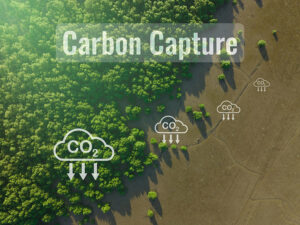New EFI report outlines “actionable” BECCS deployment pathways

The report – Taking Root: A Policy Blueprint for Responsible BECCS Development in the United States – outlines how BECCS can advance decarbonisation needs by providing the permanent removal of greenhouse gases from the atmosphere while also accelerating the decarbonisation of the electric grid with firm and dispatchable climate-friendly power.
The report was released at an event on 27 June in Washington D.C., co-hosted by the EFI Foundation and Resources for the Future.
The event included remarks from Senator Martin Heinrich (Democrat - New Mexico), Senator Bill Cassidy (Republican - Louisiana) and former US Secretary of Energy Ernest Moniz, president and CEO of the EFI Foundation.
"Leading projections for keeping global temperature rise to below two degrees rely on significant BECCS deployment," said Moniz. "EFI has examined the opportunities and challenges for meeting this goal and recommends steps to get there."
EFI's roadmap outlines the need for establishing a holistic policy framework to guide BECCS development, highlighting the technology's unique potential to offer net-negative emissions at a large scale while also providing a steady, economically feasible energy supply.
The authors emphasised that the sector has the potential to make a significant difference if provided with improved financing.
"I am particularly interested in the opportunities that BECCS might provide for our forest managers and our communities," said Heinrich. "It could help make profitable the removal of small diameter woody fuels that are often destined to act as ladder fuels for wildfires."
"With regards to BECCS, the best is yet to come," said Cassidy. "In Louisiana, we've long turned wood into wood pellets for use in bioenergy plants, and now we have multiple companies exploring the development of new BECCS plants in the region – creating more jobs and providing an avenue for Louisiana to remain a global leader in energy production."
Eight major elements of the report are organised into three broad themes: 1) policies to expand and accelerate BECCS deployment; 2) leveraging the social, economic and environmental co-benefits of BECCS; and 3) rules of the road to promote responsible development of BECCS.
"We are very pleased to see the EFI report is emphatic in its embrace of BECCS as a key climate solution," said Will Gardiner, CEO of biomass giant Drax. "To achieve net zero, governments must support carbon dioxide removal solutions, including BECCS. If properly supported, the US offers a promising environment to deploy BECCS, with the potential to remove up to 2.2 gigatons of CO2 per year.
"Over the past two years, Drax has been progressing a Global BECCS program, with a primary focus in North America. Two initial sites in the US South have been selected with nine more sites under evaluation, creating a pipeline of development opportunities by 2030," Gardiner explained.
"If the policy recommendations in the report were implemented, this would enable Drax to invest billions of dollars in deploying BECCS earlier and in turn unlock climate, economic and environmental benefits for our communities."
The EFI report, which was sponsored by the Hewlett Foundation, Battelle, Drax and Enviva, can be viewed here.


























